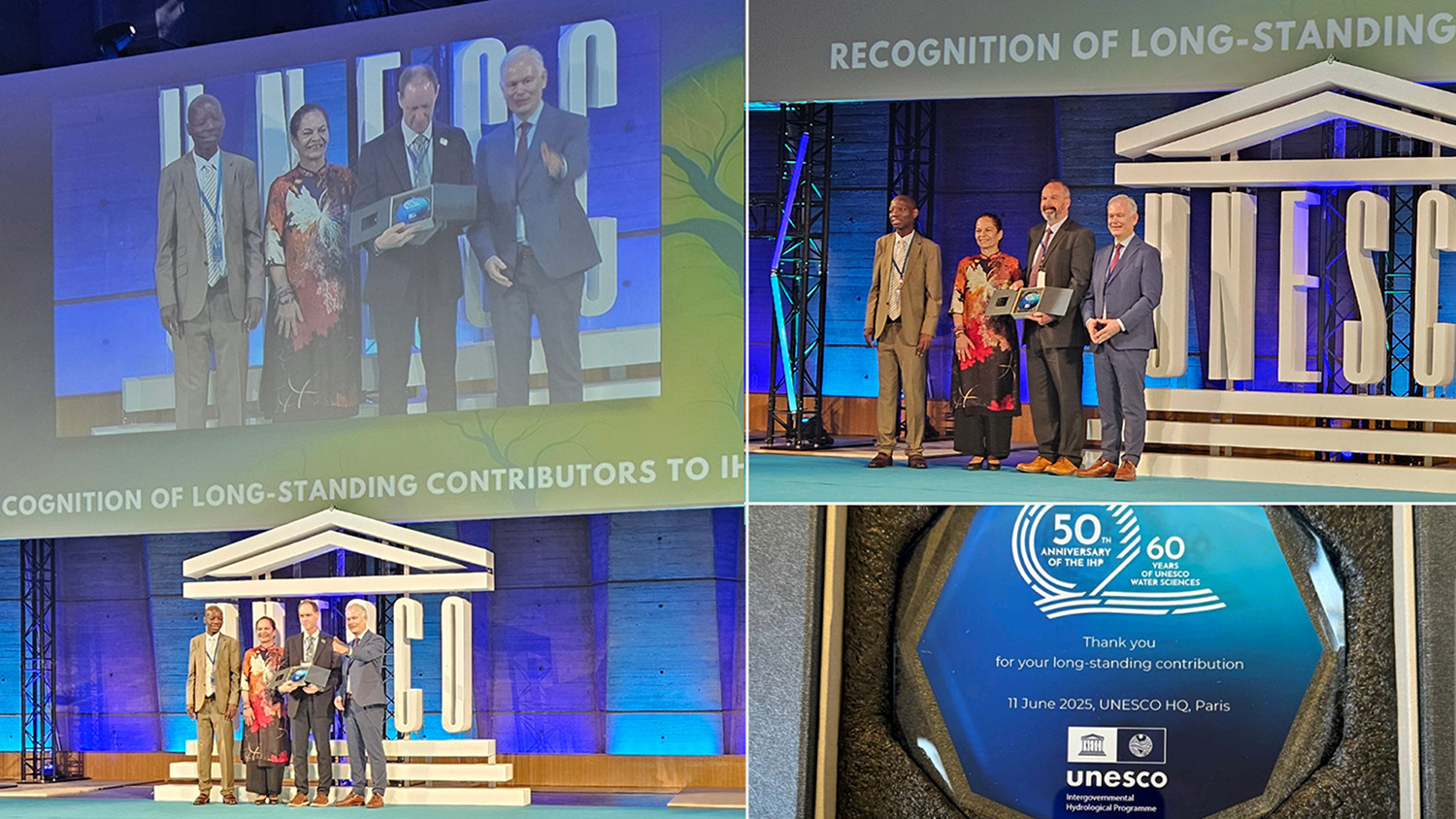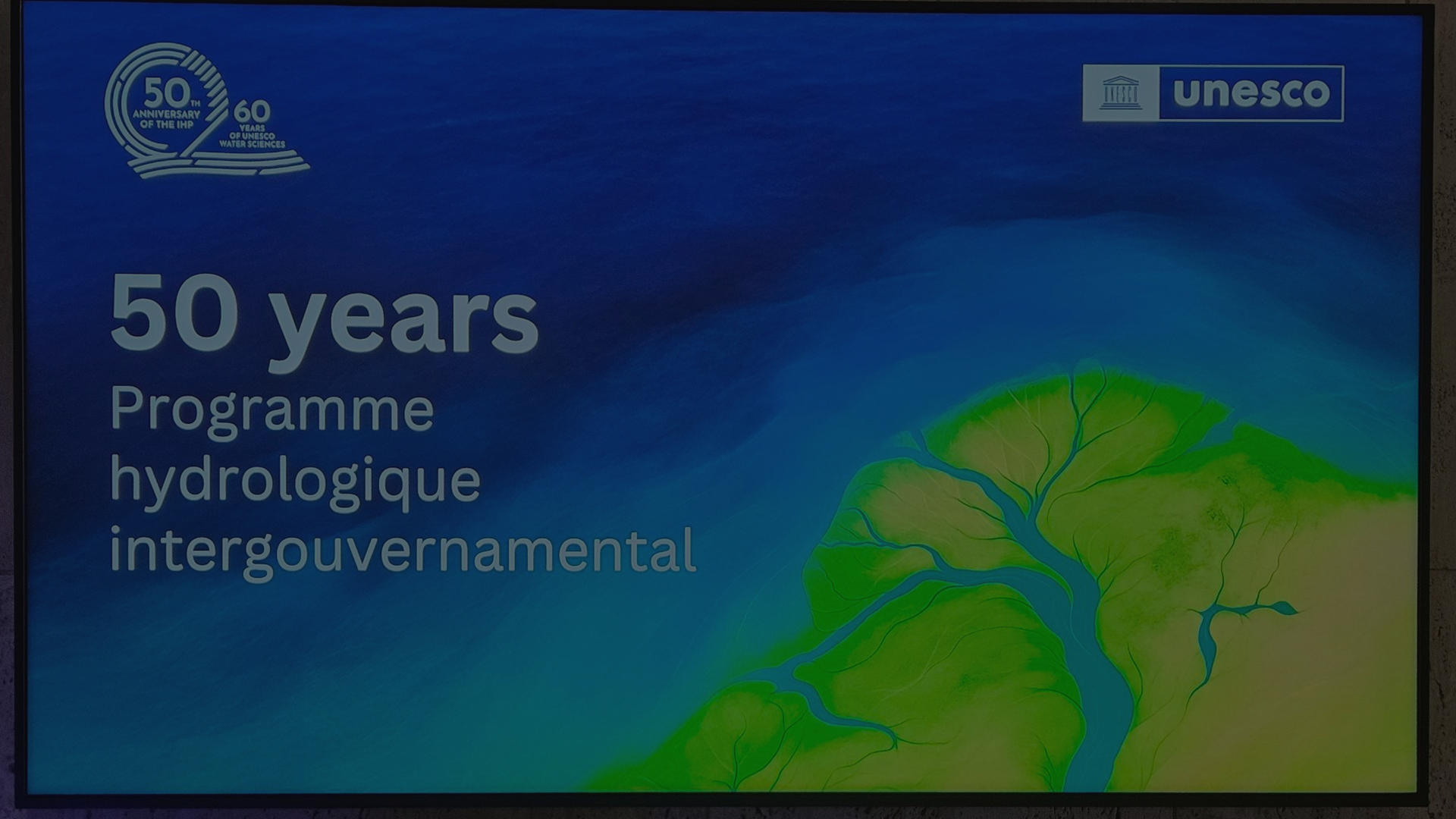Water is one of our planet’s most vital resources, yet managing it sustainably remains a critical challenge. Water shortages are affecting an increasing number of people globally, pollution levels are rising, and climate change is exacerbating extreme events such as floods and droughts. Addressing these complex challenges requires sustained and collective international efforts to develop science-based solutions that are accessible to all, from policymakers, to educators and local actors. That’s where the Intergovernmental Hydrological Programme (IHP) of the United Nations Educational, Scientific and Cultural Organization (UNESCO) comes in.
Established in 1975, the IHP facilitates nations coming together to address water challenges. Over the last half century, a wide range of UK universities, research institutes and governmental bodies have led, contributed to, and benefitted from all aspects of the Programme. These inputs have been led and coordinated by UK Centre for Ecology & Hydrology (UKCEH), in our role supporting the Government through provision of the secretariat for the UK IHP National Committee. As we celebrate 50 years of IHP and 60 years of UNESCO’s commitment to water sciences, we reflect on the programme’s global impact - and the UK’s pivotal role in shaping it.
1965–1975: A global network of living laboratories
In 1965, UNESCO launched the International Hydrological Decade (IHD) - the first initiative of its kind to promote international collaboration in the field of freshwater. At a time of growing water demand, uneven access, and growing concerns about water quality and pollution, this pioneering initiative aimed to:
- Advance scientific understanding of the water cycle
- Foster international collaboration and facilitate knowledge exchange
- Standardise hydrological methods and data collection
- Improve education and training for future water experts
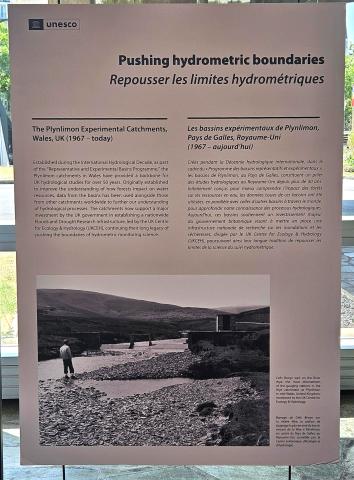
One of the IHD’s most transformative legacies was the creation of Representative and Experimental Basins. These carefully selected river catchments became living laboratories; places where scientists across the globe could standardise data collection and investigate the effects of rainfall, runoff, land use, and water quality in real-world conditions.
The UK played a pivotal role in this endeavour. The Plynlimon catchments in Wales became a flagship site, offering some of the earliest insights into how forests and land use affect water flow and quality. Over the following decades, Plynlimon was the focus for many studies of hydrological processes by researchers from across the UK and internationally. Collaboration around experimental catchments remains integral to the IHP, with the UK well-positioned to contribute through the Flood and Drought Research Infrastructure (FDRI).
From IHD to IHP: UK leadership for flagship initiatives
Building on the IHD’s success, and recognising the need for enduring collaboration between nations in the field of water science, UNESCO launched the Intergovernmental Hydrological Programme (IHP) in 1975. What began as research-focused initiative evolved into a cross-cutting, transdisciplinary programme, integrating different disciplines and socio-cultural dimensions to help address increasingly complex water challenges.
A key driver of this evolution has been the development of global flagship initiatives that not only advance science but support capacity building, knowledge sharing, and community empowerment. The UK has played a central role in shaping several of IHP’s most influential initiatives, including:
- FRIEND (Flow Regimes from International Experimental and Network Data)
- G-WADI (Global Network on Water and Development Information for Arid Lands)
- ISI (International Sediment Initiative)
- HELP (Hydrology for the Environment, Life and Policy)
UKCEH has been involved in FRIEND since its inception in 1985 and that involvement continues today through the ROBIN initiative (Reference Observatory of Basins for INternational hydrological climate change detection). Additionally, Assistant Professor Bastien Dieppois (Coventry University) carries on UK leadership as the European lead coordinator (EURO-FRIEND).
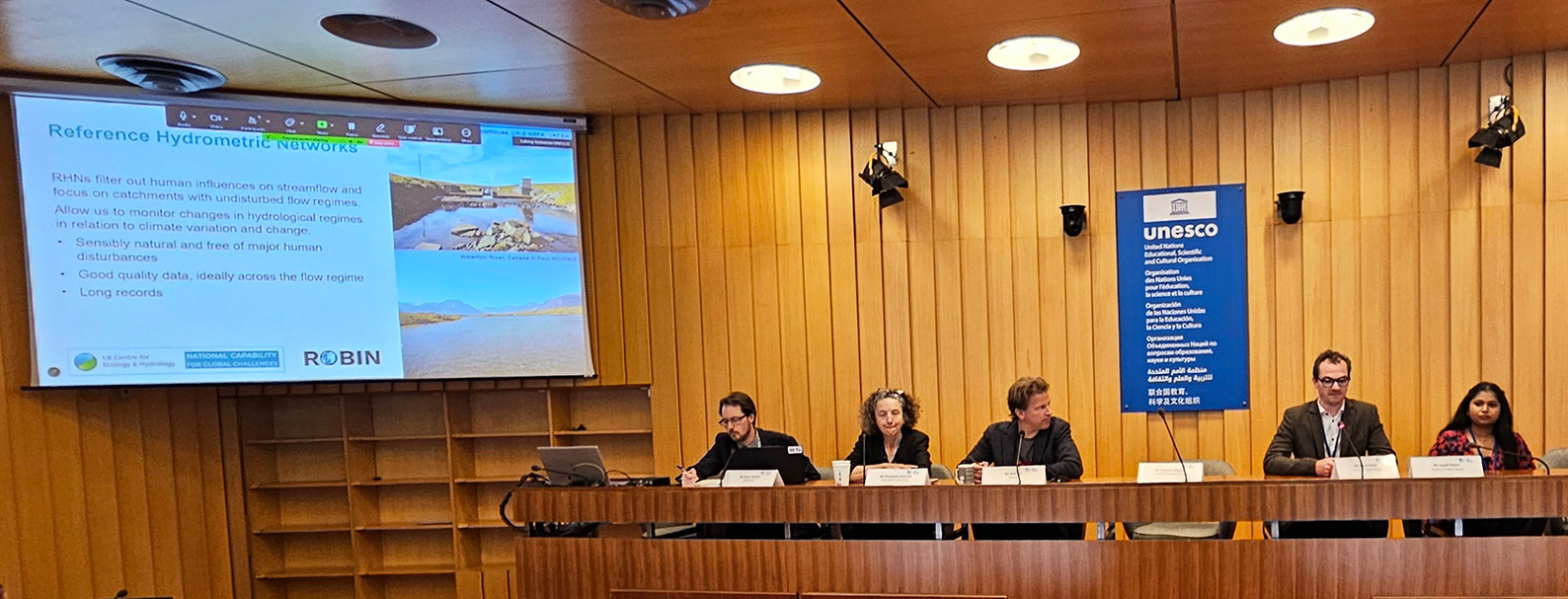
Strengthening contributions through the global water family network
A key feature of the IHP has been creation of the UNESCO “water family” - a global network of 170 National Committees, 29 Category 2 water centres, and 93 water-related Chairs/UNITWINs, that work together and contribute directly to the strategic objectives and priorities of the IHP.
These networks are instrumental to improving knowledge and building capacity for sustainable water management, as well as enabling coordinated responses to challenges at local, regional and global levels.
Through its provision of the secretariat for the UK IHP National Committee, UKCEH has been an active and committed member of the water family since the beginning. Today, Prof Harry Dixon and Joanna Savage form the secretariat, coordinating UK input into the Programme and providing guidance on the execution and future direction of the Programme at IHP Council Sessions on behalf of the UK.
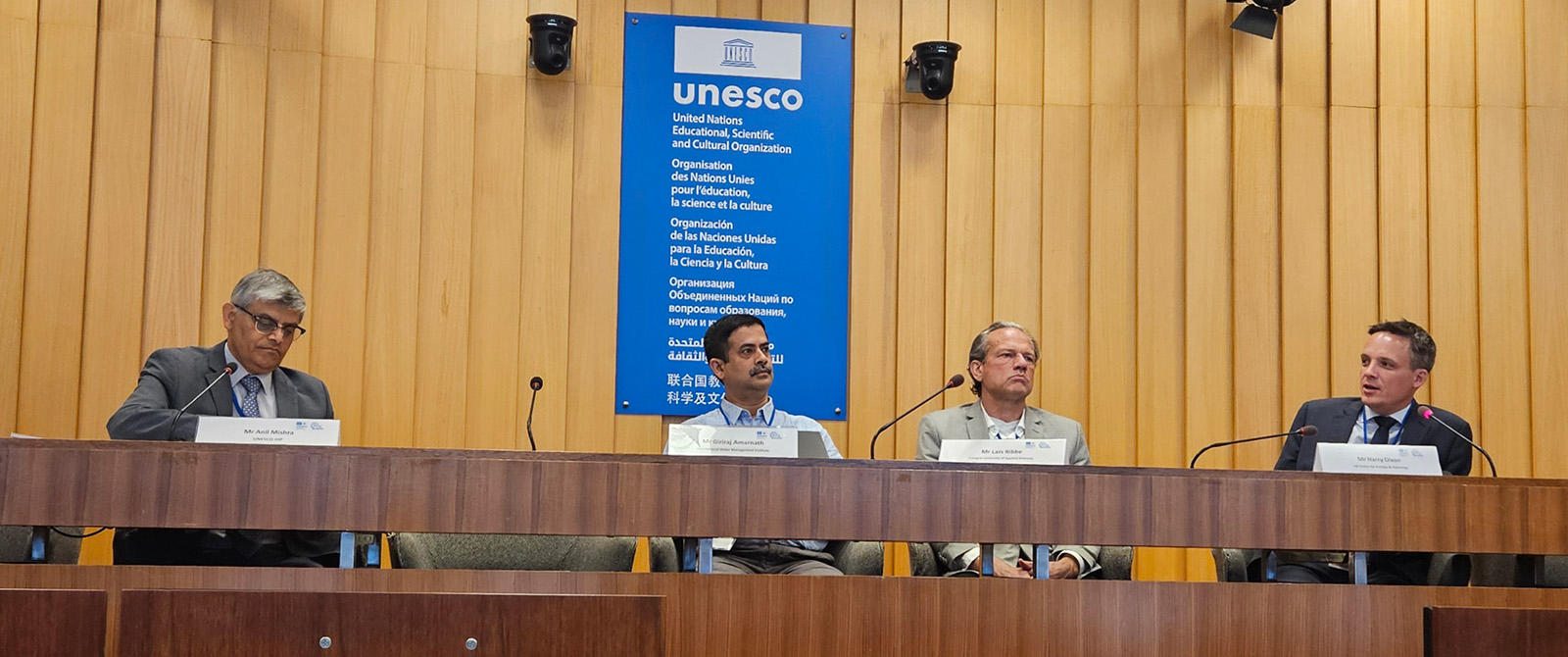
In the 2000s the UK expanded its contributions to the Water Family network and the IHP. In 2005, the University of Dundee established a UNESCO Category 2 Centre for Water Law, Policy and Science (CWLPS). In 2016, the University of Birmingham established the UNESCO Chair in Water Science, and subsequently set up the UNITWIN network on Ecohydrological Interfaces. CWLPS plays a key role in advancing the IHP's integrated approach to water management, providing much-needed global education and research in sustainable water governance.
More recently, CWLPS has been invited to co-lead the revitalisation of the HELP initiative. HELP will directly support the IHP’s mission by re-establishing a global network of river basins that strengthen the connection between hydrological science and societal needs.
Through the Chair/UNTWIN programme, the University of Birmingham collaborates with international academic institutions to develop innovative solutions to global water issues. This work focuses on integrating new knowledge, sensor technologies, and citizen science to create more effective, inclusive approaches to sustainable water management. These long-standing UK contributions to the UNESCO water family, through national coordination, scientific leadership, international collaboration, education and policy development, highlight how the IHP can mobilise scientific expertise into practical solutions to address today’s pressing water challenges.
Meeting the water challenges of the future
The IHP’s ninth phase (IHP-IX) focuses on water security in a changing world, and helping member states achieve their water-related sustainable development goals, specifically UN Sustainable Development Goal 6: clean water and sanitation for all.
Looking ahead, Audrey Azoulay (Director General of UNESCO) remarked in the opening of the IHP Anniversary Celebrations on 11 June, that in a rapidly changing world: “Tackling this unprecedented challenge requires unprecedented cooperation.”
No single country can effectively address these complex issues alone. Programmes like the IHP are uniquely positioned to lead our collective efforts to drive meaningful change and build a water secure world.
As such, continued participation in the upcoming phases of the IHP remains a priority for UKCEH and the UK as a whole.
Join the events online: 50th anniversary of UNESCO Intergovernmental Hydrological Programme
